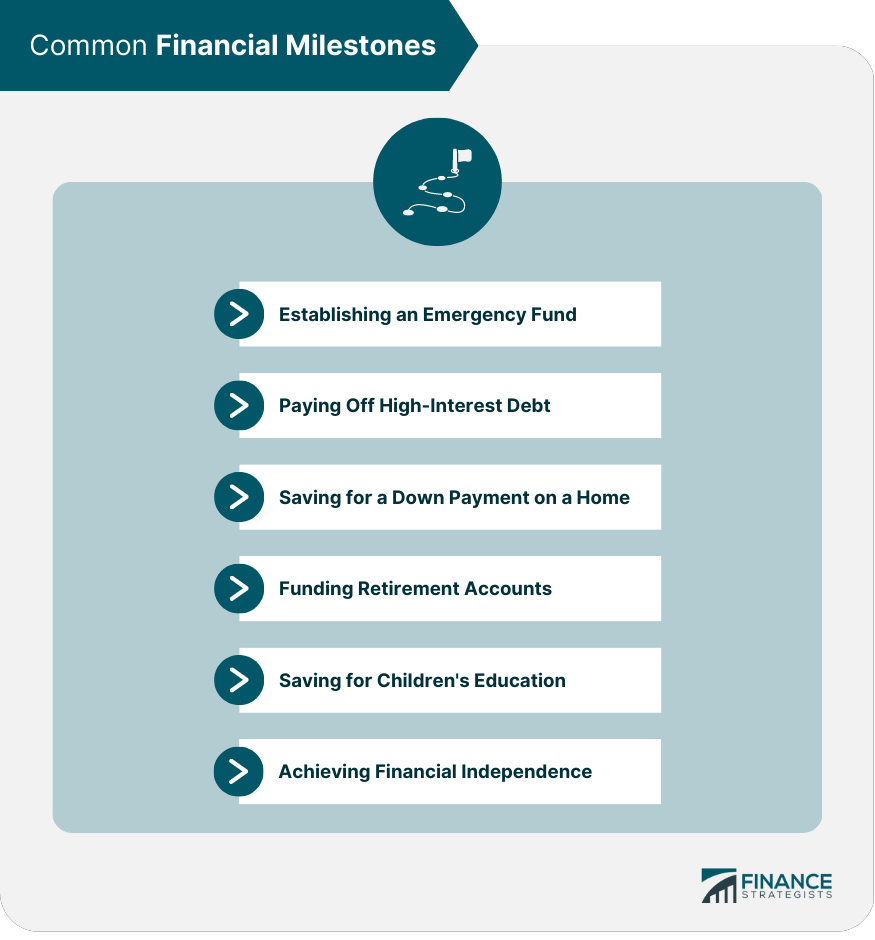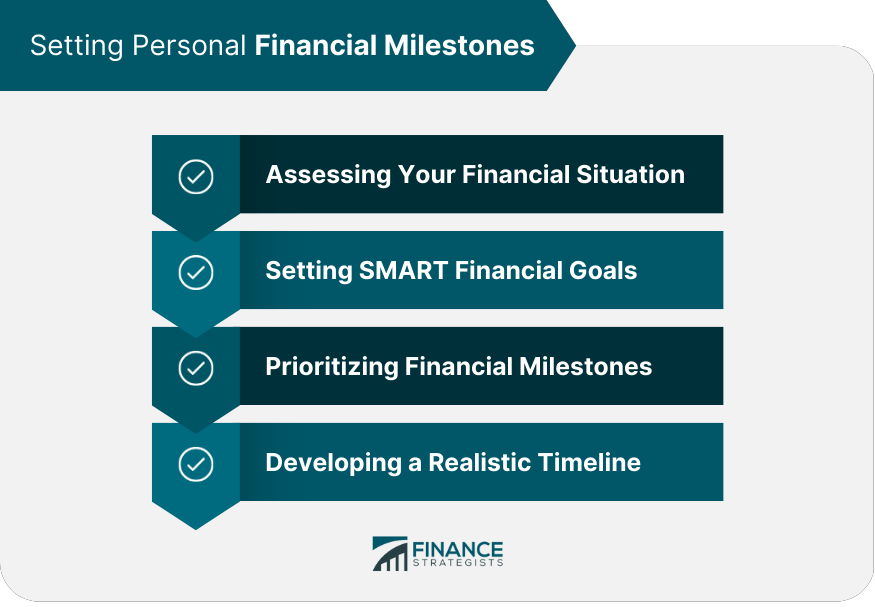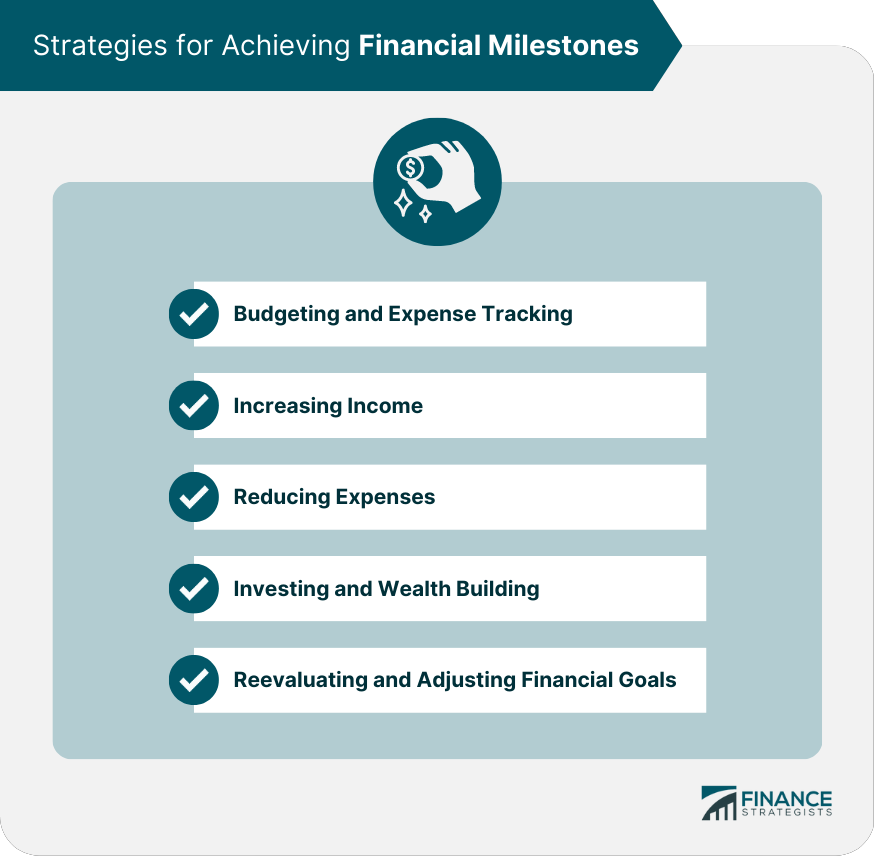Financial milestones are specific goals that you set for yourself or your business to achieve in terms of finances. They are important markers of progress that help you measure your financial success. Examples of financial milestones include paying off debt, building an emergency fund, saving for retirement, buying a home, and achieving a certain net worth. Financial milestones can vary depending on your personal or business financial goals, but they should be specific, measurable, and realistic. By setting financial milestones, you can create a roadmap for your financial journey and stay motivated and focused on your goals. Achieving financial milestones can also provide a sense of accomplishment and financial security. It's important to regularly assess your progress and adjust your goals as needed to ensure you stay on track towards achieving your ultimate financial goals. Short-term financial milestones are goals that can be achieved within one to two years. These may include establishing an emergency fund, paying off a credit card, or saving for a vacation. Short-term milestones are crucial because they lay the foundation for financial stability and provide motivation for continued progress. Medium-term financial milestones typically take two to five years to achieve. Examples include saving for a down payment on a home, paying off student loans, or starting a small business. These milestones require more planning and perseverance but are essential for long-term financial stability. Long-term financial milestones can take five years or more to achieve. These may include funding retirement accounts, saving for children's education, or achieving financial independence. Long-term milestones require consistent effort and a long-term vision but ultimately lead to financial security and freedom. An emergency fund is a savings account designed to cover unexpected expenses, such as job loss, medical emergencies, or urgent home repairs. Financial experts recommend having three to six months' worth of living expenses saved in an emergency fund. High-interest debt, such as credit card balances, can be detrimental to financial health. Paying off these debts should be prioritized to reduce interest costs and improve cash flow. Homeownership is a significant financial milestone for many individuals and families. Saving for a down payment requires discipline and patience but can lead to long-term financial benefits, such as building equity and tax advantages. Saving for retirement is a critical long-term financial milestone. Contributing to retirement accounts, such as a 401(k) or an IRA, ensures financial security during retirement and allows for potential tax benefits. For parents, saving for their children's education is an important financial goal. Establishing a college savings plan, such as a 529 plan, can help parents prepare for future education expenses and provide tax advantages. Financial independence is the point at which passive income, such as investments or rental income, covers living expenses. This milestone enables individuals to work less or pursue other interests without financial constraints. To set personal financial milestones, it is crucial to assess your financial situation by evaluating your income, expenses, debt, and assets. This analysis will provide a clear understanding of your financial health and help identify areas for improvement. When setting financial milestones, use the SMART criteria: specific, measurable, achievable, relevant, and time-bound. This approach ensures that your goals are clear, realistic, and trackable. Based on your financial assessment and SMART goals, prioritize your financial milestones. Consider factors such as urgency, potential impact, and alignment with your long-term vision. Create a timeline for achieving your financial milestones. This timeline should account for your current financial situation, the priority of each milestone, and the necessary steps to reach them. Creating and maintaining a budget is essential for achieving financial milestones. A budget helps you understand your spending habits, identify areas to cut expenses, and allocate resources towards your financial goals. Regularly tracking your expenses ensures that you stay on track and make adjustments as needed. Increasing your income can accelerate progress towards financial milestones. Consider seeking higher-paying job opportunities, negotiating a salary increase, developing a side hustle, or investing in your education to acquire new skills. Reducing expenses frees up resources to allocate towards financial milestones. Review your budget to identify areas where you can cut costs, such as housing, transportation, or discretionary spending. Investing is a powerful tool for achieving financial milestones, as it allows your money to grow over time through compound interest. Develop an investment strategy that aligns with your risk tolerance, time horizon, and financial goals. As your financial situation evolves, it may be necessary to reevaluate and adjust your financial milestones. Regularly review your goals and make changes based on your current circumstances and priorities. Monitoring your progress towards financial milestones is crucial for staying on track and maintaining motivation. Regularly review your financial goals, assess your progress, and make adjustments as needed. Life changes and unforeseen circumstances may require you to adjust your financial plans. Be flexible and adaptable, adjusting your financial milestones and strategies as needed to accommodate new situations. Acknowledge and celebrate your successes as you reach financial milestones. This recognition provides motivation for continued progress and reinforces positive financial habits. Additionally, learn from any setbacks, using them as opportunities for growth and improvement. Financial milestones play a significant role in achieving financial stability and independence. By setting personal financial goals, developing strategies to achieve them, and monitoring progress, individuals can create a clear path towards financial success. The ongoing process of setting, working towards, and achieving financial milestones ultimately leads to a more secure and fulfilling financial future.What Are Financial Milestones?
Types of Financial Milestones
Short-Term Milestones
Medium-Term Milestones
Long-Term Milestones
Common Financial Milestones
Establishing an Emergency Fund
Paying Off High-Interest Debt
Saving for a Down Payment on a Home
Funding Retirement Accounts
Saving for Children's Education
Achieving Financial Independence

Setting Personal Financial Milestones
Assessing Your Financial Situation
Setting SMART Financial Goals
Prioritizing Financial Milestones
Developing a Realistic Timeline

Strategies for Achieving Financial Milestones
Budgeting and Expense Tracking
Increasing Income
Reducing Expenses
Investing and Wealth Building
Reevaluating and Adjusting Financial Goals

Monitoring Progress and Celebrating Success
Regularly Reviewing Financial Milestones
Adjusting Plans as Needed
Celebrating Achievements and Learning from Setbacks
Conclusion
Financial Milestones FAQs
Financial milestones are specific goals that you set for yourself or your business to achieve in terms of finances. They are important markers of progress that help you measure your financial success.
Financial milestones provide a roadmap for your financial journey and help you stay motivated and focused on your goals. They also help you track your progress and make adjustments to your financial plan if necessary.
Some common financial milestones include paying off debt, building an emergency fund, saving for retirement, buying a home, and achieving a certain net worth.
To set financial milestones, first, assess your current financial situation and identify areas for improvement. Then, set specific, measurable, and realistic goals that align with your long-term financial plan. Finally, track your progress regularly and adjust your goals as needed.
Once you achieve a financial milestone, celebrate your success and use it as motivation to continue working towards your next goal. You should also reassess your financial plan and make any necessary adjustments to ensure you stay on track towards achieving your ultimate financial goals.
True Tamplin is a published author, public speaker, CEO of UpDigital, and founder of Finance Strategists.
True is a Certified Educator in Personal Finance (CEPF®), author of The Handy Financial Ratios Guide, a member of the Society for Advancing Business Editing and Writing, contributes to his financial education site, Finance Strategists, and has spoken to various financial communities such as the CFA Institute, as well as university students like his Alma mater, Biola University, where he received a bachelor of science in business and data analytics.
To learn more about True, visit his personal website or view his author profiles on Amazon, Nasdaq and Forbes.











